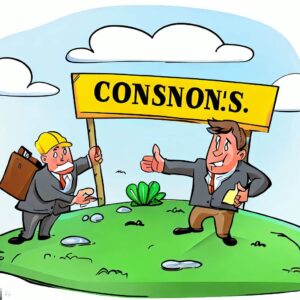If you are a business owner looking to expand your operations or invest in real estate, purchasing land may be on your mind. However, before making any decisions, it is essential to weigh the potential benefits and drawbacks of this investment. In this article, we will discuss the advantages and disadvantages of buying land for business purposes, guiding you towards informed decision-making that aligns with your long-term business goals.
Pros:
1 – Control over Property:
Owning land offers a unique opportunity to exercise full control over your property. With ownership comes the power to develop and modify the space in accordance with your specific needs and preferences. This level of autonomy allows you to tailor the property to suit your business requirements, ultimately leading to increased efficiency and productivity.
For instance, imagine owning a parcel of land that is currently vacant. As the owner, you have the ability to design and construct a building that perfectly suits your company’s needs, whether that be a warehouse, manufacturing facility, or office complex. This affords you the flexibility to create a workspace that is optimized for your business operations, resulting in smoother workflows and faster turnaround times.
Furthermore, ownership provides you with the freedom to make changes to the property as the market evolves or as your business grows. You can expand the size of the building, add additional features such as parking lots or green spaces, or even sell or lease parts of the property to generate passive income.
In short, owning land gives you complete control over your property and offers unparalleled flexibility and customization options. By leveraging this autonomy, you can transform your property into a highly-efficient, productive, and profitable asset for your business.

2 – Appreciation in Value:
One of the most significant advantages of owning land is its inherent value appreciation potential. Unlike many other assets, land is a finite resource and its availability is dwindling day by day. This, coupled with the fact that demand for land is ever-increasing due to rapid urbanization and population growth, means that the value of your land could potentially appreciate significantly over time.
The appreciation in land value can be attributed to a multitude of factors, including changes in zoning laws, shifts in population demographics, and fluctuations in the local economy. If the area surrounding your land undergoes development or gentrification, this could also drive up the land’s value, particularly if it is located in a prime location. As a result, owning land could provide a substantial return on investment if you decide to sell it in the future.
Moreover, even if you do not plan on selling your land, its increasing value can still benefit you financially. For example, you could use your land as collateral to secure loans or lines of credit, or lease it to tenants for commercial or agricultural purposes to generate passive income.
Owning land offers a unique opportunity for long-term financial gain through appreciation in value. By leveraging the finite and increasingly valuable resource, you can potentially reap substantial returns on investment and other financial benefits that can help you achieve your personal and business goals.

3 – No Rent Payments:
One of the most appealing aspects of owning the land where your business is located is the financial benefit of not having to pay rent. Rent is a recurring expense that can add up quickly and eat into your profits, especially if you’re operating in a high-cost area. By owning the land outright, you eliminate this cost entirely, providing greater financial stability for your business in the long run.
Additionally, the absence of rent payments means that you have more control over your cash flow. You won’t have to worry about sudden rent increases or unexpected lease renewals, which can impact your budget and bottom line. Instead, you can focus on investing in your business and making strategic decisions that will help it grow and succeed.
Moreover, the money that you would have spent on rent payments can be redirected towards other important areas of your business, such as marketing, research and development, or expanding your workforce. This could help you achieve faster growth and generate more revenue, ultimately leading to greater financial success.
Owning the land where your business is located offers a significant financial advantage by eliminating the need for rent payments. This provides greater financial stability, eliminates the risk of sudden rent increases, and frees up valuable resources that can be invested in other areas of your business.

4 – Tax Benefits:
In addition to the financial benefits discussed earlier, owning land can also offer a range of tax benefits that make it an attractive investment option for business owners. One such benefit is the ability to claim deductions for property taxes and mortgage interest payments.
Property taxes are a significant expense for most businesses, especially those located in high-value areas. However, if you own the land where your business is located, you may be able to deduct these taxes from your overall tax liability. This deduction can help reduce your taxable income and lower your overall tax burden, providing a much-needed financial boost.
Similarly, if you took out a mortgage to purchase your land, you may be eligible to deduct the interest payments on that loan from your taxes. This can further reduce your tax liability and increase your bottom line, providing more resources to invest in your business and achieve greater success.
Furthermore, owning land can also provide additional tax benefits, such as depreciation deductions or conservation easements. Depending on your specific circumstances, these deductions could provide significant financial advantages, making it even more advantageous to own land as a business owner.
Owning land offers a range of tax benefits that can help reduce your overall tax burden and increase your bottom line. By claiming deductions for property taxes and mortgage interest payments, you can enjoy greater financial stability and invest more resources into growing your business.

5 – Additional Income Streams:
In addition to the other benefits mentioned, owning land can also provide a multitude of opportunities to generate additional income streams for your business. Depending on the location and zoning laws, there are several ways that you can leverage your land to create new revenue streams.
One option is to rent out all or part of the land to other businesses or individuals. This could include leasing out parking spaces, storage units, or even agricultural land to farmers. By doing so, you can generate consistent rental income without having to invest in developing the land yourself.
Alternatively, you could develop the land into other businesses, such as retail spaces or rental properties. By constructing buildings or renovations, you can attract tenants who will pay rent and help you generate passive income over the long term. This strategy not only creates new revenue streams but can also increase the value of your land, potentially leading to higher returns if you decide to sell it in the future.
Moreover, owning land can provide opportunities for short-term income generation, such as hosting events or renting space for filming movies or commercials. These one-off events can provide a quick infusion of cash while also promoting your brand and generating exposure for your business.
Owning land provides ample opportunities to generate additional income streams for your business. By leasing out the land, developing it into other businesses, or hosting events, you can create consistent and passive revenue streams that help to stabilize your business’s financial position over time.

Cons:
1 – High Upfront Costs:
While owning land provides a multitude of benefits, it’s important to acknowledge that there are also some significant financial disadvantages to consider. One such disadvantage is the high upfront costs associated with purchasing and developing land.
Purchasing land can require a substantial upfront investment, which may not be feasible for all businesses, particularly those that are just starting out or have limited access to capital. Additionally, developing the land can be expensive, especially if there are zoning restrictions or environmental concerns that need to be addressed before construction can begin.
Moreover, the process of acquiring permits and approvals from local authorities can be time-consuming and costly. You may need to hire attorneys, architects, or other professionals to help navigate the complex regulations and ensure that your project meets all legal requirements.
Despite these challenges, it’s important to note that the benefits of owning land can outweigh the upfront costs in the long run. By owning the land outright, you eliminate the need for rent payments and potentially generate passive income streams that can help recoup your investment over time. Additionally, the value of land tends to appreciate over time, providing significant returns on investment if you decide to sell the property in the future.
While there are certainly high upfront costs associated with purchasing and developing land, it’s important to weigh these against the potential benefits that ownership can provide. With careful planning, budgeting, and execution, owning land can be a smart long-term investment for your business.

2 – Limited Liquidity:
It’s important to recognize that owning land as an asset differs from investing in more traditional equities or securities. One of the critical differences is the relatively illiquid nature of real estate. Unlike stocks or bonds, selling a piece of property can be a lengthy and challenging process, especially if you need to raise capital quickly.
The time it takes to sell land can vary depending on several factors, such as location, market conditions, and demand. Even in a strong economy, finding buyers for your land may be challenging, and the process could take several months or even years. While the appreciation value of land over time often provides significant financial gains, these gains are not liquid and can’t easily be converted into cash.
This limited liquidity of land ownership also poses a challenge in situations where you need immediate access to cash, such as during economic downturns, personal emergencies, or other unforeseen events. Selling land during times like these can be challenging, and you may have to accept lower offers than you would in normal market conditions.
Despite these challenges, owning land can still provide valuable benefits, such as long-term appreciation and consistent passive income streams. It’s essential to recognize that owning land is a long-term investment that requires careful consideration and planning. You should analyze your business’s financial needs and liquidity requirements before deciding to invest in real estate.
While land ownership can provide significant financial rewards over time, its illiquid nature can limit access to cash when needed. As with any investment, careful analysis of your business’s financial situation should be conducted to ensure you’re choosing the right investment vehicle for your organization.

3 – Maintenance Costs:
Owning land is not only a long-term investment, but it also involves ongoing maintenance costs that must be considered. Like all physical assets, land requires routine upkeep to preserve its value and maximize its potential. As the owner, you are responsible for all expenses associated with maintaining your property, including landscaping, security measures, and repairs.
Landscaping and ground maintenance can become a considerable expense, especially if your property is extensive or requires specialized care. Regular upkeep of lawns, gardens, and trees is necessary to maintain a pleasant and professional appearance, which can enhance the overall value of your property. Similarly, installing and maintaining security systems, barriers, and fencing can be costly but necessary to ensure the safety and protection of your property.
The cost of ongoing repairs can also add up quickly and reduce your overall profitability. Even minor issues, such as roof leaks, plumbing problems, or electrical faults, require immediate attention to prevent further damage or liability concerns. If left unattended, these small problems can escalate into significant repair bills and even legal disputes.
Despite these maintenance costs, owning land continues to offer significant benefits over time. Careful planning and budgeting can help minimize these expenses while maximizing your property’s potential. Additionally, investing in regular maintenance, repairs, and upgrades can help increase the value of your land, making it more appealing to potential buyers or tenants.
Owning land requires ongoing maintenance and upkeep, which can be costly and reduce overall profitability. However, with careful planning and budgeting, the benefits of owning land can outweigh these costs, providing long-term financial gain and stability for your business.

4 – Zoning Restrictions:
When considering owning land, it’s important to recognize that zoning restrictions and environmental regulations can pose significant obstacles to your development plans. These restrictions vary by location and intended use of the property and can significantly impact your ability to develop and utilize the land as you intend.
For example, zoning laws may prohibit certain types of businesses from locating on the property, restrict the height or size of buildings, or limit the number of parking spaces available. Additionally, environmental regulations may require costly remediation efforts or restrict the use of certain areas of the property.
These limitations can significantly impact the overall value of the land and hinder your ability to generate revenue streams or maximize your investment. For this reason, it is critical to research local zoning laws and regulations before investing in land.
However, overcoming zoning restrictions is not impossible. In many cases, you may be able to apply for exemptions, variances, or permits that allow you to operate outside of the standard zoning constraints. In most cases, seeking legal help and professional guidance will help you navigate the process and increase your chances of success.
Zoning restrictions and environmental regulations can pose significant challenges when owning land. It’s essential to conduct thorough research and seek professional assistance to ensure that you understand all these restrictions before purchasing land. Through careful planning, budgeting, and legal advice, you can overcome these obstacles and maximize the value of your land for your business.

5 – Market Volatility:
As with any investment, owning land comes with inherent market volatility risks. The value of land can fluctuate based on a variety of external factors such as economic downturns, changes in interest rates, shifts in consumer preferences, and natural disasters that can all directly impact the demand for land.
For instance, an economic recession or slowdown may reduce demand for real estate properties, which could result in decreased property values. Similarly, shifts in consumer behavior or changing trends in urbanization can also impact the demand for land, especially if your property is located in less desirable areas.
Additionally, changes in interest rates can affect the affordability of financing, causing a direct impact on the demand and price of land. If interest rates rise significantly, it could lead to a decrease in demand, resulting in lower prices. Conversely, if interest rates fall significantly, this could lead to an increase in demand, leading to higher prices.
It’s important to recognize that these factors are beyond your control as a landowner. While you can conduct thorough market research and due diligence, there will always be unpredictable external variables that could impact your land’s value.
However, despite market volatility, land has demonstrated its resilience over time. Even during market downturns, the value of land tends to remain relatively stable compared to other assets, providing a hedge against inflation and long-term financial stability.
Market volatility poses a risk when owning land. However, by conducting thorough research, seeking professional guidance, and managing your investments strategically, you can mitigate these risks and take advantage of the potential benefits of owning real estate.

Conclusion
In conclusion, buying land for business purposes offers advantages and disadvantages. It provides control over the property and potential appreciation in value, but requires a significant upfront investment with ongoing maintenance costs. Careful consideration of the pros and cons is necessary before making any decisions. Seeking advice from experts will help you evaluate the potential risks and benefits, and assist you in making informed decisions that align with your long-term business goals.
Sources
- https://www.sba.gov/business-guide/plan-your-business/buy-or-lease-commercial-real-estate
- https://www.investopedia.com/articles/personal-finance/090815/pros-and-cons-investing-land.asp
- https://www.nolo.com/legal-encyclopedia/pros-and-cons-buying-raw-land.html
- https://www.nar.realtor/commercial-real-estate/buying-land-for-your-commercial-development
